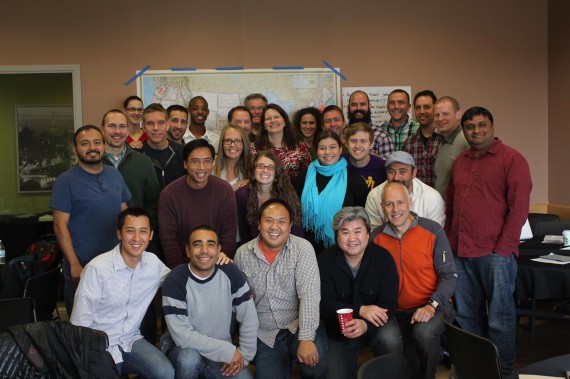
About 30 Area Directors got together this Fall to talk about apostolic movements.
By Chris Nichols
“Lord, at this time are you going to restore the kingdom of Israel?”
It was sometime during the forty days after Jesus had risen from the dead. Acts says Jesus was giving them convincing proofs he was alive, teaching his disciples about his kingdom, and the coming Holy Spirit.
It’s hard to imagine what the experience was like. In the presence of the back from the dead Jesus, his kingdom was taking on new meaning on daily basis. Yet even in the midst of that life-altering experience, the disciples could not keep themselves from focusing on their own self-interest. They felt compelled to interpret Jesus’ return as being about restoring the nation of Israel. They must have thought, “Finally, our people will get our due. We will take our place as God’s people, above all others in the world.”
They reflected in that moment a primary struggle of the human condition. We want our Savior to be about us. If we are not lobbying for our national interests, we find ourselves wanting him to focus our people, our communities, our perspectives. Even if we have learned to think more expansively about the configuration of his Kingdom, we too easily settle into communities that look, speak, and act like us.
With the disciples, Jesus acts quickly to correct their misconception and is just as quick to correct ours. His kingdom would be not be the return of the nation of Israel. Their role was no longer to be nationalists or ethno-centrists. Their roles were now to take on a new identity as witnesses and witnesses far beyond any place they could have imagined. In an ever-expanding arc of witness, they would, by the power of the Holy Spirit be witnesses not only to their own people but to those they despise and those who they don’t yet know. They would be crossing boundaries, moving out, and learning that the person, message, and power of Jesus created a kingdom that would encompass every people, every language, every nation.
As it was then it is now. Jesus’ kingdom movement is and was always intended to be a multiethnic, multicultural, multi-national community, socioeconomically diverse, committed to crossing boundaries and barriers with the good news that He has risen!
Apostolic leaders of Jesus kingdom movements must own this priority. We will always struggle with wanting Jesus to restore the world so that it reflects who we are. We are sinful, self-interested people and on this side of eternity, we will always instinctively be drawn to our own, no matter how we identity most with others.
So, as leaders we must constantly measure the movement we lead by the measure of Jesus’ standards in Acts 1:8. Are we and those we lead moving out beyond the neighborhoods of our greatest comfort? Are we giving witness to the Risen Christ to those who are different from us? Are we responding to his call to go the ends of the earth? We must not make the mistake of thinking the call to outer edges as extraordinary. We’ve made it so out of a misunderstanding of how kingdom communities are built. No, the common call is for us to move out and into communities of those least like us. And we won’t need to manufacture the call to leave where we are and go further out. Attentiveness to Jesus in prayer and his word will accomplish that for us. He will always call us to take another step.
In presence of the risen Christ, may our question be, “Where would you have me go in order that your kingdom might be built?”

Sign up to receive our blog posts via e-mail and get instant access to our APE Library with videos, seminars, leaders notes, and more.

